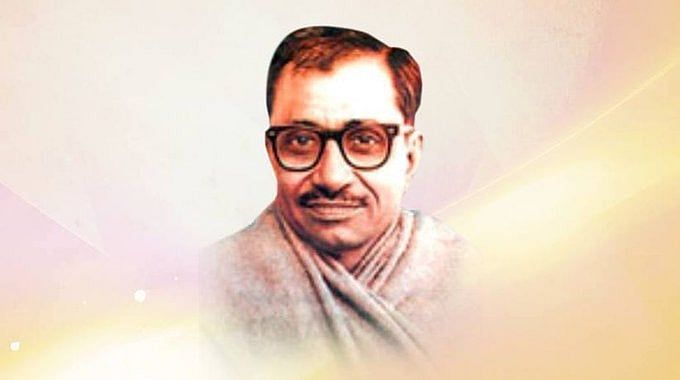
Independent India stands at the threshold of its Amrit Kaal (a golden era), while the rest of the world finds itself at a crossroads of uncertainty. In this scenario, India, which has always upheld a holistic and nature-centric perspective, is emerging as a role model for sustainable development in the entire world. The Western civilization, which has eternally viewed nature as a resource for exploitation, is struggling to find answers. Systems entangled in ideologies like communism, socialism, and capitalism are either collapsing or becoming ensnared in internal and external conflicts.
At the time of India’s independence, the nation too faced a similar dilemma. The then ruling elite was unable to envision a development path suited to India’s unique circumstances and oscillated between these three ideological frameworks. It was at that moment of uncertainty that a visionary thinker emerged on the horizon of this great nation, offering a timeless philosophy—known to the world as Integral Humanism. The proponent of this philosophy was Pandit Deendayal Upadhyaya, a dedicated pracharak (full-timer) of the Rashtriya Swayamsevak Sangh (RSS) and one of the key founders of the Bharatiya Jana Sangh (precursor to the Bharatiya Janata Party). However, he consistently emphasized that he had not created this philosophy; rather, it was a natural extension of India’s ancient knowledge traditions. Being rooted in the Sanatan (eternal) ethos, it remains just as relevant today. On his 67th death anniversary, February 11, we remember this modern sage and his contributions.
A Vision for Holistic Human Development
In his short yet impactful life, Pandit Upadhyaya gave the world a guiding principle—one that has now gained widespread acceptance. This principle was simple yet profound: humans should not be seen in fragments but as whole beings, integrating the body, mind, intellect, and soul. Similarly, the entire universe should be viewed as an interconnected entity. The five fundamental elements—earth, water, fire, air, and space—should be understood in their harmonious relationships, and human actions should be aligned accordingly. Respect for nature and its conservation should be integral to our way of life.
Although the United Nations has not formally acknowledged Pandit Deendayal Upadhyaya or his philosophy, the truth is that all 17 Sustainable Development Goals (SDGs) adopted by the UN on September 25, 2015, are mere reflections of Integral Humanism. Coincidentally, this date also marked the beginning of his birth centenary year.
Over time, this vision became widely recognized under the name Integral Humanism, placing human beings at its core. Pandit Upadhyaya believed that just as an individual has a soul, so does a nation. He termed this as ‘Chiti’ of the Rashtra —the nation’s collective consciousness. According to him, India’s core values were enshrined in its villages, and rural communities were the true custodians and trustees of the nation’s soul. Therefore, an overall, all-inclusive development could only be achieved through the holistic development of villages. To bring this vision to life and validate it on ground, his close associate Nanaji Deshmukh established the Deendayal Research Institute (DRI). Recognized as a pioneer in holistic rural development, DRI has evloved village development models that are being replicated across the country. Through various projects in Gonda, Beed, and Chitrakoot, the institute has successfully integrated indigenous knowledge with practical and contemporary applications. As a result of these efforts, Nanaji Deshmukh was honored with the Bharat Ratna in 2019.
The Man, The Thinker, The Leader
At the time of documenting his philosophy, Pandit Deendayal Upadhyaya was actively engaged in politics, serving as the ideological and organizational head of the Bharatiya Jana Sangh. Since the party was founded in 1952, he served as its General Secretary for 15 years before becoming its President in December 1967. His leadership saw the rapid rise of the Jana Sangh on India’s political landscape. However, at the young age of 51, his life was tragically cut short under mysterious circumstances.
A multifaceted scholar, Pandit Upadhyaya deeply studied India’s socio-economic conditions in both national and global contexts. His insights astonished even the leading political and economic experts of his time. Through his speeches, he awakened the Indian masses, urging them to embrace self-respect. But how? Through hard work, by mastering the four pursuits of life—Dharma (righteousness), Artha (prosperity), Kaama (desires), and Moksha (liberation), and by maintaining a cohesive balance between mind, intellect, body, and soul. He emphasized that Indians should stay deeply rooted in their cultural heritage, but without becoming stagnant. They should remain ever-conscious, guided by two fundamental principles: Deshanukul (aligned with nation’s cultural needs) and Yuganukul (relevant to the times).
A Path Forward for India
Today, as the world’s most populous country, Indian society is striving to reclaim its lost civilizational distinctiveness. Inspired by historical consciousness, culture, and traditions, India seeks to redefine its own developmental parameters. Pandit Upadhyaya questioned why international organizations and foreign agencies should determine whether India is developed or undeveloped, literate or illiterate, healthy or unhealthy. He argued that if India failed to set its own benchmarks, external forces would continue to impose their agendas upon it—something we have witnessed time and again.
Embracing Integral Humanism as its guiding philosophy, the current government follows principles like Antyodaya—uplifting the last person in society. The influence of Pandit Upadhyaya’s holistic vision is evident in the policies, programs, and governance models of both the central and many state governments. From welfare schemes for the underprivileged to advancements in technology, self-reliance in defense, and excellence in space exploration—India’s growing strength is a testament to the values he propagated.
The political framework shaped by his ideas has transformed India from a struggling, uncertain nation into a confident global power. Today, India stands tall—not as a feeble state, but as a self-esteemed, self-reliant force moving rapidly towards a future of dignity and prosperity.
Mangal Prabhat Lodha
Minister of Skills, Employment, Entrepreneurship, and Innovation, Government of Maharashtra